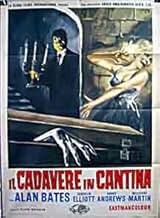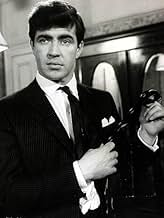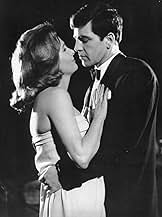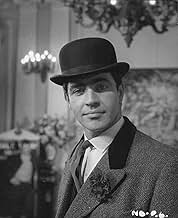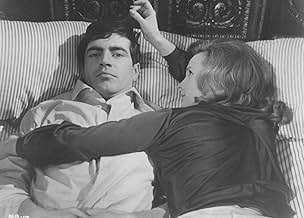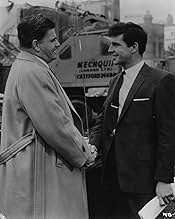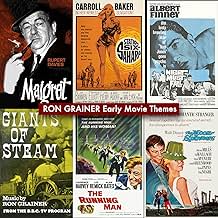Agrega una trama en tu idiomaA young and ambitious businessman hires an unemployed upper-class man to tutor him in the life skills which he thinks are necessary to succeed. When he succeeds, disaster threatens.A young and ambitious businessman hires an unemployed upper-class man to tutor him in the life skills which he thinks are necessary to succeed. When he succeeds, disaster threatens.A young and ambitious businessman hires an unemployed upper-class man to tutor him in the life skills which he thinks are necessary to succeed. When he succeeds, disaster threatens.
- Dirección
- Guionistas
- Elenco
- Nominada a1 premio BAFTA
- 1 premio ganado y 3 nominaciones en total
Avice Landone
- Mrs. Horton
- (as Avice Landon)
Anneke Wills
- Girl
- (as Annika Wills)
- Dirección
- Guionistas
- Todo el elenco y el equipo
- Producción, taquilla y más en IMDbPro
Opiniones destacadas
I saw this film in 1964 when it was first released; and it is still the only film that I have sat through for two consecutive showings. I thought it was brilliant, sharp and very funny. Alan Bates, then a major international star, was at his very best: funny, cynical, cold, vicious, everything the role required. The supporting cast - led by Millicent Martin, Harry Andrews, Denholm Elliott - were also superb.
Jimmy Brewster (Bates) is, to use the derogatory upper-class term, "an ambitious yob", a working-class chap toiling anonymously at his desk in a large real-estate company and wanting better things, when one day he has an accidental encounter in a restaurant with Charlie Prince (Elliott), the disgraced son of Brewster's employer. As Charlie puts it, "One day a black cloud appeared in my office, and shortly after that I departed under it." Charlie is a worthless wastrel, but he has one skill: he can show Jimmy how to dress and talk properly and to be a "gentleman". The trade-off is that Jimmy will give Charlie a place to live and money for expenses. Charlie is a good teacher and Jimmy is a brilliant student, conning everyone in sight, slowly climbing the ladder to success. Then one day, Charlie asks Jimmy to lay a large bet for him - with Jimmy's money - on a horse, and the horse wins, at astronomical odds. Charlie is very much in the money again, and decides he doesn't need Jimmy any longer. But Jimmy turns the tables, does away with Charlie, and keeps the money for himself. And continues his climb up the corporate and social ladders, all the way to the top. Along the way he woos Charlie's sister, Ann (Millicent Martin), and marries her. In a memorable scene, while courting Ann, Jimmy takes her to massive country estate that is conveniently empty, pretending that it belongs to his family. Ann looks at the magnificent place, suitably impressed, smiles at Jimmy and delivers one of the best lines in the film: "Darling, how did you know my size?"
And then Charlie's body is found, and perhaps the ruthless, if charming, Jimmy is about to come a-cropper. Or perhaps not.
It's a brilliant film on all levels. The great tragedy is that it appears to be no longer available, on film or on video/DVD. If I could find the magic lamp, and be granted one filmic wish, "Nothing But The Best" would be in general distribution on DVD next week.
Jimmy Brewster (Bates) is, to use the derogatory upper-class term, "an ambitious yob", a working-class chap toiling anonymously at his desk in a large real-estate company and wanting better things, when one day he has an accidental encounter in a restaurant with Charlie Prince (Elliott), the disgraced son of Brewster's employer. As Charlie puts it, "One day a black cloud appeared in my office, and shortly after that I departed under it." Charlie is a worthless wastrel, but he has one skill: he can show Jimmy how to dress and talk properly and to be a "gentleman". The trade-off is that Jimmy will give Charlie a place to live and money for expenses. Charlie is a good teacher and Jimmy is a brilliant student, conning everyone in sight, slowly climbing the ladder to success. Then one day, Charlie asks Jimmy to lay a large bet for him - with Jimmy's money - on a horse, and the horse wins, at astronomical odds. Charlie is very much in the money again, and decides he doesn't need Jimmy any longer. But Jimmy turns the tables, does away with Charlie, and keeps the money for himself. And continues his climb up the corporate and social ladders, all the way to the top. Along the way he woos Charlie's sister, Ann (Millicent Martin), and marries her. In a memorable scene, while courting Ann, Jimmy takes her to massive country estate that is conveniently empty, pretending that it belongs to his family. Ann looks at the magnificent place, suitably impressed, smiles at Jimmy and delivers one of the best lines in the film: "Darling, how did you know my size?"
And then Charlie's body is found, and perhaps the ruthless, if charming, Jimmy is about to come a-cropper. Or perhaps not.
It's a brilliant film on all levels. The great tragedy is that it appears to be no longer available, on film or on video/DVD. If I could find the magic lamp, and be granted one filmic wish, "Nothing But The Best" would be in general distribution on DVD next week.
It's not very good, i could live without watching it, too much plot armor and the pace is uneven : At times, it seems it's gonna be great but it's never becoming that interesting neither intense.
Yet, it was a fun ride. Bates is charismatic and delightful to watch, same as Elliott and Martin. There are even some unpredictable moments, i'll spare the details in order to avoid spoilers. Overall it's enjoyable and dark comedy fans will enjoy it mostly. But for sure, it's not as clever as it thinks it is and you are gonna need a lot of suspension of disbelief in order to buy what is happening here.
Ending is exactly as the previous moments. Not as clever as they thought, and if you think it thoroughly, it doesn't even make sense. But as i said, actors are so charismatic that they make it work.
Yet, it was a fun ride. Bates is charismatic and delightful to watch, same as Elliott and Martin. There are even some unpredictable moments, i'll spare the details in order to avoid spoilers. Overall it's enjoyable and dark comedy fans will enjoy it mostly. But for sure, it's not as clever as it thinks it is and you are gonna need a lot of suspension of disbelief in order to buy what is happening here.
Ending is exactly as the previous moments. Not as clever as they thought, and if you think it thoroughly, it doesn't even make sense. But as i said, actors are so charismatic that they make it work.
What a superb film in my opinion difficult to beat. The British system slyly used to the main characters advantage . Alan Bates and Denholm Elliot excel in this classy tongue in cheek rendition of how to succeed. A film worthy of release particularly since the demise of both main stars.
The year before he won an Oscar for "Darling", Frederic Raphael adapted Stanley Ellin's short story "Nothing But the Best" for the screen. It was a kind of comic "Room at the Top" directed by that fine and underrated director Clive Donner and photographed by none other than Nicolas Roeg. Alan Bates is the social climbing Jimmy Brewster who does marry the boss' daughter, (Millicent Martin, very good), on his way up the ladder but still has to indulge in a spot of murder as well.
It's got a terrific supporting cast that includes Denholm Elliot at his Machiavellian best as Bates' tutor in the art of social mobility, Harry Andrews as his boss and, best of all, Pauline Delaney as an over-sexed landlady. It all adds up to a delightfully sharp satire yet hardly anyone has seen it. Seek it out because, apart from anything else, it's also one of the great London films.
It's got a terrific supporting cast that includes Denholm Elliot at his Machiavellian best as Bates' tutor in the art of social mobility, Harry Andrews as his boss and, best of all, Pauline Delaney as an over-sexed landlady. It all adds up to a delightfully sharp satire yet hardly anyone has seen it. Seek it out because, apart from anything else, it's also one of the great London films.
A pretty superb black comedy with award winning screenplay by American born Frederick Raphael, distinguished screenwriter. A good story, great performances and excellent production. And, more than 50 years later, still fresh. Popular music, fashions, decor, language, behaviour -so much has changed in 50 years. But a lot remains unchanged: money and class to name but two.
Brewster (Alan Bates) is an exceptional young man. Of lower middle class background he can maintain a habitually pleasant expression, be charming and humorous, is very quick-witted, opportunistic, coldly calculating , completely unscrupulous and will do anything necessary to feed an almost unlimited ambition - without ever losing his habitual pleasant expression. Brewster is determined to climb the social ladder but the exclusive club of the upper class and very wealthy keeps its doors firmly shut to him and his like. However a happy chance meeting suggests a scheme to breach the club's defences. One of its members (Mr Prince - Denholm Elliot), thoroughly-disgraced son, disowned by his family, can be persuaded, for money, to train Brewster in the ways of his class: how to dress, how to speak, how to behave. And quick learner, Brewster turns out to be. But Brewster is no snob and is always practical: while it's his boss's daughter he plans to wed, he nevertheless finds it advantageous to retain a place in his middle-aged landlady's heart and bed.
But it is the screenplay which received the film's single award and the dialogue is at its smartest as Prince instructs imposter Brewster in the ways of the class he aspires to join. It's not just their opinions but the different manner with which each must be delivered. Faking an Oxbridge background, how to behave when watching college rowing (be ostentatiously disparaging as if an older and better rower). Suitable opinions (circa 1963) on foreigners: Americans - "let us down badly over Suez". Black people "make fine cricketers". The commandments seem to include: be brief, never bore, never be overly earnest, understate, don't be adventurous.
This is Frederick Raphaels satire and take on the British upper classes, that a clever fake can remain under all circumstances undetected. I think the evidence is that their antennae are especially finely tuned for the avoidance of just such unfortunate marriages. However history suggests that the titled owner of the grand London estate agents auctioneers (Harry Andrews) where Brewster works, prizes business acumen over actual social background. Over time, with good schooling for the next generation, social class can be retained. But without money neither a growing financial empire nor a dynasty is possible.
Some great moments as when Brewster's pleasant expression is tested to its limits when a familiar large case arrives at his shortly be in-laws grand house, and falls from a considerable height. Bates and Denholm Elliot are both superb. A great British film.
Until Talking Pictures TV came on the scene and revived some of these quality films, I would have never realised the cinema talent Britain had. So badly are we let down by the broadcasters
Brewster (Alan Bates) is an exceptional young man. Of lower middle class background he can maintain a habitually pleasant expression, be charming and humorous, is very quick-witted, opportunistic, coldly calculating , completely unscrupulous and will do anything necessary to feed an almost unlimited ambition - without ever losing his habitual pleasant expression. Brewster is determined to climb the social ladder but the exclusive club of the upper class and very wealthy keeps its doors firmly shut to him and his like. However a happy chance meeting suggests a scheme to breach the club's defences. One of its members (Mr Prince - Denholm Elliot), thoroughly-disgraced son, disowned by his family, can be persuaded, for money, to train Brewster in the ways of his class: how to dress, how to speak, how to behave. And quick learner, Brewster turns out to be. But Brewster is no snob and is always practical: while it's his boss's daughter he plans to wed, he nevertheless finds it advantageous to retain a place in his middle-aged landlady's heart and bed.
But it is the screenplay which received the film's single award and the dialogue is at its smartest as Prince instructs imposter Brewster in the ways of the class he aspires to join. It's not just their opinions but the different manner with which each must be delivered. Faking an Oxbridge background, how to behave when watching college rowing (be ostentatiously disparaging as if an older and better rower). Suitable opinions (circa 1963) on foreigners: Americans - "let us down badly over Suez". Black people "make fine cricketers". The commandments seem to include: be brief, never bore, never be overly earnest, understate, don't be adventurous.
This is Frederick Raphaels satire and take on the British upper classes, that a clever fake can remain under all circumstances undetected. I think the evidence is that their antennae are especially finely tuned for the avoidance of just such unfortunate marriages. However history suggests that the titled owner of the grand London estate agents auctioneers (Harry Andrews) where Brewster works, prizes business acumen over actual social background. Over time, with good schooling for the next generation, social class can be retained. But without money neither a growing financial empire nor a dynasty is possible.
Some great moments as when Brewster's pleasant expression is tested to its limits when a familiar large case arrives at his shortly be in-laws grand house, and falls from a considerable height. Bates and Denholm Elliot are both superb. A great British film.
Until Talking Pictures TV came on the scene and revived some of these quality films, I would have never realised the cinema talent Britain had. So badly are we let down by the broadcasters
¿Sabías que…?
- TriviaOn the commentary track for Jack, el magnífico (1979), director Peter Bogdanovich said he became a huge fan of Denholm Elliott after watching this film, which was before he became a director. He cast Elliott in an important co-starring role in Noises Off... (1992), which was his last film.
- Créditos curiososClosing credits epilogue: ? THE END IS A PHRASE WHICH USUALLY CLOSES OTHER PEOPLES STORIES: IT NEVER APPLIES TO ONES OWN
- Bandas sonorasTitle Song
(Nothing But The Best)
Sung by Millicent Martin
To Music by Ron Grainer and Lyrics by Frederic Raphael
Selecciones populares
Inicia sesión para calificar y agrega a la lista de videos para obtener recomendaciones personalizadas
- How long is Nothing But the Best?Con tecnología de Alexa
Detalles
- Tiempo de ejecución1 hora 39 minutos
- Relación de aspecto
- 1.66 : 1
Contribuir a esta página
Sugiere una edición o agrega el contenido que falta

Principales brechas de datos
By what name was Nothing But the Best (1964) officially released in India in English?
Responda
